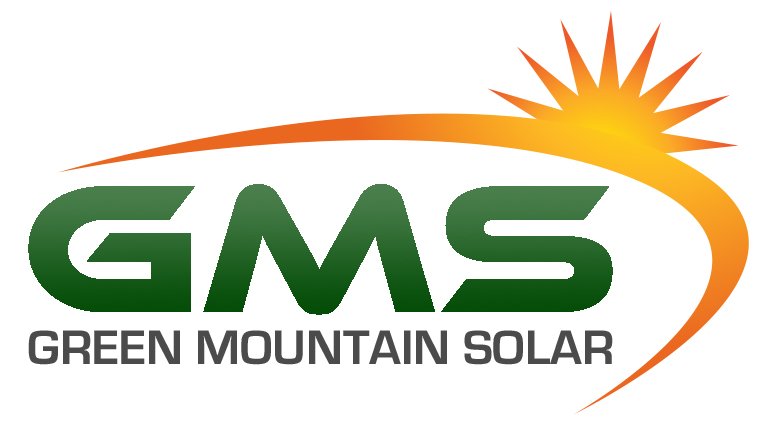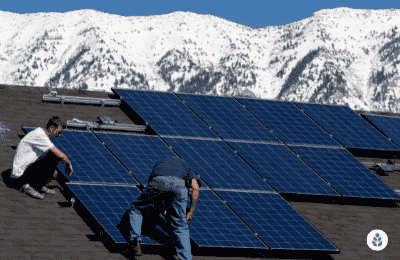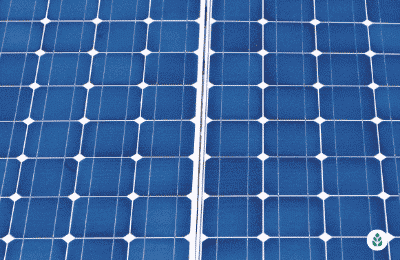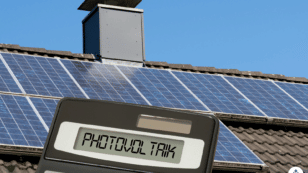
Is Solar Worth It in Vermont? (2024 Homeowner's Guide)
Here’s a quick overview of solar viability in Vermont:
- Vermont ranks 37th in the country for solar installations.*
- The average electricity rate is 20.46 cents per kilowatt-hour (kWh)**
- The average solar payback period is 10 years***
- Homeowners are eligible for a favorable net metering program and the federal solar investment tax credit (ITC)
- The average homeowner saves $29,752 over the lifetime of their solar system in Vermont***
*According to the Solar Energy Industries Association.1
**Data from the Energy Information Administration.2
***Calculated assuming the system is purchased in cash.
Each product and or company featured here has been independently selected by the writer. You can learn more about our review methodology here. If you make a purchase using the links included, we may earn commission.
Vermont ranks 37th in the country for solar installations. Coupled with the fact that residents pay higher prices for photovoltaic (PV) equipment than most homeowners in the country and that energy needs are notoriously low in the area, many Vermonters wonder if solar is a good investment. The short answer is that it usually is, but it’s not right for every home or financial situation.
Below, you’ll learn how to use the most common metrics to figure out if your property is a good candidate for solar panel installation. We’ll also discuss some of the most significant benefits of going solar in Vermont and some crucial things you need to consider before converting your home.
To speak with an EcoWatch-vetted professional who can help you determine whether solar is worth it for your Vermont home, follow the links below.

SunCommon

Regional Service
Average cost
Pros
- Certified B Corp
- Offers products from leading manufacturers
- Many years of experience
Cons
- No leases or PPAs
- Expensive

Blue Raven Solar
Pros
- Industry-leading in-house financing
- Competitive pricing
- Excellent reputation
Cons
- Doesn't offer solar batteries (coming 2022)

Green Mountain Solar

Local Service
Average cost
Pros
- Locally owned and operated
- Offers products from leading manufacturers
- Great warranty coverage
Cons
- No leases or PPAs
- Relatively young company
Watch Below: How Well Will Your Solar Panels Still Work When Covered In Snow?
How to Figure Out if Solar Panels are Worth It in Vermont
Solar panels prove to be a sound investment for most Vermont residents, but they aren’t guaranteed to save every homeowner money. Below are the top metrics for calculating if your home is a good fit for solar.
What’s Your Home Electricity Consumption?
The first thing you’ll want to assess is your monthly energy usage, which you can usually find on your most recent electric bill. Since the primary financial benefit of installing solar is the reduction your panels provide on your utility bills, homes with higher energy needs will naturally stand to save more. A good rule of thumb is that households that use more than 500 kWh per month will benefit from solar panels.
The average home in Vermont consumes around 567 kWh monthly. This monthly consumption is well below average and only higher than it is in two other states, but it’s still above the cutoff of 500 kWh. In reality, even homeowners who use less than 500 kWh per month in Vermont will likely benefit from solar, given the high energy rates in the Green Mountain State.
How Much Is It To Go Solar in Vermont?
The price of solar panels in Vermont averages around $3.59 per watt, which is much higher than the national average of $3.33. As such, your money won’t go quite as far for solar equipment as it would in other states. With most residents needing a 6-kW system, the average total is still well below the national average at around $15,078 after the federal tax credit is applied.
Solar panels prove more valuable and save more money in areas where energy consumption or electricity rates are high. While Vermonters use far less electricity than most US residents, they pay significantly higher prices for power. As such, Vermont solar panels are considered more valuable than in most other states.
What’s the Payback Period for Solar in Vermont?

The average solar panel payback period in Vermont is around 10 years, which is well below the average of 12 years throughout the rest of the country. A normal range for this timeline in Vermont is between 7 and 13 years. The shorter payback period indicates that solar is more valuable in Vermont than in most other states.
What Are Average Buy-Back Rates in Vermont?
Most states have a net metering policy that helps solar customers offset or even eliminate their electric bills. Net metering lets power pass back and forth between your home and the electric grid, and you get compensated — usually in electric bill credits — for all power you send to your electric company.
Vermont has a good net metering policy that requires all electric companies to purchase energy back from solar customers. It mandates at least an “avoided-use” rate, which is slightly lower and less beneficial than the retail rate. This is still beneficial and allows many homeowners to reduce their energy bills significantly without having to pay for a solar battery.
How Much Sun Does Your Roof Receive?
Solar panels are more valuable in areas where the sunlight is abundant because they use the available sunlight to produce electricity and offset your energy bills. Vermont receives around 167 sunny days per year, which is well below the national average of 205 days of sunshine. The below-average sun availability in Vermont does mean that solar panels will be less efficient than in other states, but most residents still get enough sun to make solar worth it.
You also need to look at some individual factors for your home that can influence solar viability. For example, the direction your roof faces can make a massive difference, as south-facing and west-facing roofs are the only options that receive ample sunlight in the United States. Additionally, shading on your roof can be an issue. You will need to look for obstructions like trees and buildings near your home to determine how efficient and valuable your panels will be.
What’s the Outlook on Solar in Vermont?
Vermont often ranks as the greenest state, which means renewable energy sources like solar are widely accepted and even favored by residents.3 Biomass and hydroelectric power are currently the top-producing clean energy sources in Vermont, but the solar market has been expanding and improving over the past decade as well, with increases in residential, commercial and utility-scale solar installations, as well as community solar applications.4
Vermont has lofty Renewable Portfolio Standard (RPS) goals that incentivize solar conversions, and it also has great solar incentives available to homeowners looking to go solar. Overall, the solar policies in Vermont are outstanding, and the likelihood is that the solar market will continue to grow and improve in the coming years.
Benefits of Solar Energy in Vermont
Going solar in Vermont provides numerous benefits that make converting far more appealing. We’ll discuss the most significant upsides of solar energy in Vermont below.
Electricity Bill Savings
The most substantial benefit of installing solar panels in Vermont is the savings you’ll enjoy on your energy bills. When solar panels produce electricity for your home, they reduce the amount of energy you have to pull from the grid and pay for. The average Vermonter pays around $116.01 per month for electricity, which means you could save around $1,392 every year your solar panels produce energy.
Also important is the fact that your solar panels will let you lock in lower electricity rates for 25+ years. This means you’ll avoid price hikes that are expected in the future, something that’s particularly useful in Vermont, where the energy prices are already so high.
Lower Taxes & Access to Other Incentives
Vermont is considered a very solar-friendly state, partly because it offers some appealing solar incentives to residents. One of the most enticing solar incentives is the federal solar tax credit (ITC), which is provided by the federal government to all Vermont homeowners. The ITC is a credit to your income taxes, totaling 26% of your total installation expense. In Vermont, most residents will enjoy an ITC of around $6,462.
Some additional Vermont solar incentives are explained briefly below:
- Net Metering: The State of Vermont mandates that all electric companies offer net metering to solar customers, at at least an avoided-cost rate. This helps reduce your solar panel payback period and bumps up your ROI.
- Renewable Energy Systems Sales Tax Exemption: This is a sales tax exemption that prevents all solar customers from having to pay sales tax on solar equipment or installation expenses.
- Uniform Capacity Tax and Exemption for Solar: Solar panels increase your home value, which would normally cause your property taxes to go up. This property tax exemption prevents that from happening when you install solar panels.
Home Resale Value Increase
Solar panels make your home more valuable, which is a huge reason many residents decide to go solar. According to research done by Zillow, the average home will go up by around 4.1% in value from the addition of a solar power system.5 Given the average home value of $385,968 in Vermont, the average value bump will be around $15,824.6 This dollar amount could be even higher in more expensive areas, like Burlington, Killington and Rutland.
It’s important to note that solar leases and power purchase agreements (PPAs) will not provide this benefit. Only solar customers who use solar financing or cash to purchase their panels will see a bump in home value.
Clean, Renewable Energy
Given that Vermont is one of the greenest states in the country, many residents will also be pleased to know that going solar provides some benefits to the environment as well. Installing solar panels will reduce your reliance on fossil fuels, which reduces your carbon footprint, produces less pollution and emissions and contributes less to climate change and global warming. Installing solar also increases your energy independence, which many residents find appealing.
What to Look Out For When Considering Solar in Vermont
Converting your home to solar is a relatively straightforward process, but there are some things you’ll need to think about and decide on before moving forward. Below are some additional considerations to make about your home solar project.
Upfront Fees

Payback Period
We strongly recommend using a solar calculator to estimate your solar panel payback period or having a local solar installer calculate it for you. Your payback period will dictate how long it will take to recuperate your investment and also your expected ROI. The average payback period in Vermont is 10 years, but anything between 7 and 13 years is considered normal. Longer payback periods will still usually result in savings, but your ROI will be lower than average.
Net Metering Policies in Vermont
The State of Vermont mandates net metering for all electric companies, which means you’ll be able to benefit from a net metering program. The minimum amount you’ll get compensated for excess energy is the avoided-cost rate, which is below the retail rate. This is still massively beneficial to solar customers, but it does mean that some homeowners will need to install a solar battery if they want to offset their electric bills entirely. The policy specifics can vary among providers, so you need to check with your electric company. Green Mountain Power provides one of the best programs in the state.
Pending Policies & Changes to Incentives
The solar industry is subject to change at any time as it develops and improves, which means the policies, incentives and solar rebates available could vary depending on when you go solar. Waiting for better incentives to become available isn’t recommended, but you should check for updates to existing policies and programs before you sign anything.
Weather & Climate in Vermont
Vermonters experienced cloudy weather more often than most US residents, experiencing just 167 sunny days annually, as opposed to the national average of 205. Although cloudy days can reduce solar panel efficiency and production by up to 90%, Vermont still sees plenty of sun to make solar a sound investment for most Vermont homeowners.
Some Vermont residents also worry about the annual snowfall, which averages around 89 inches per year and is higher than any other state average. While snow coverage will reduce or eliminate power generation, any precipitation will serve to keep your panels clean, which can increase efficiency when the sun is shining again.
Companies Pushing Solar Leases or PPAs
Finally, you need to be careful which solar company you choose to handle your solar panel installation, as not all are created equal. For example, some less reliable companies pitch solar leases or power purchase agreements (PPAs), often under the guise of “free solar panels.” Solar leases are far less beneficial than they seem, as they don’t let you take advantage of the federal investment tax credit, they don’t positively affect your home value and they save homeowners much less than other purchase options.
Unfortunately, given the popularity of solar in Vermont, there are some companies that use shady business practices to get sales. The Vermont Attorney General’s office actually had to issue a warning to local solar companies in general about aggressive and misleading marketing tactics.7 It’s always wise only to work with vetted and reliable solar companies to avoid falling victim to inflated savings claims and other scams.
Wrap Up: Is Solar Worth it in Vermont?
Installing solar panels is a fantastic investment for most Vermont homeowners, and they end up saving the average resident around $29,752 on energy bills after paying for themselves. However, solar conversion isn’t ideal for everyone and isn’t guaranteed to provide any savings. As such, it’s crucial to assess your home’s solar viability before committing.
Some important factors to consider include your monthly energy consumption, the system size and price that’s appropriate for your home and budget, the direction your roof faces, shading on your home, the net metering policy available to you and more. We suggest having a local solar installer help you decide if you will benefit from solar.
See also: Calculate the costs and savings you can get from installing solar panels
Read More About Going Solar
- What Solar Incentives Are Available in Vermont?
- What Are the Most Reputable Solar Companies in Vermont?
- Find Cost Savings on Solar in Vermont
The cost information presented in this article is derived from a comprehensive analysis, incorporating data from multiple industry sources. The average cost per watt per state was calculated based on figures from Consumer Affairs, Energy Sage, and Berkeley Lab’s Electricity Markets & Policy Department. Additionally, monthly energy consumption and the average monthly cost of electricity were sourced from the U.S. Energy Information Administration, ensuring a well-rounded and accurate representation of the information presented.
Frequently Asked Questions
At EcoWatch, we get tons of questions from Vermont homeowners about the value of solar in the Green Mountain State. Below are some of the questions we see most often.
If you have specific questions that aren’t answered here, reach out to our team of solar experts at solar@ecowatch.com.
The average solar panel payback period in Vermont is around 10 years, with a typical range of between 7 and 13 years for most homeowners. These numbers are just averages, and your payback period will depend on many factors. Some things that can influence your timeline include your monthly energy needs, your home’s energy efficiency, the net metering policy afforded by your utility company and more. You can use a solar calculator to estimate your payback period or have a local solar company do it for you.
Most of the time, yes, solar panels will save you money in Vermont. Although the average installation expenses are high, the energy savings you’ll enjoy from your solar panels will usually pay for the system total and then provide additional savings totaling around $29,752 over the panels’ 25+ years of expected energy generation.
Yes! Installing solar panels on your home will make your property more valuable. Estimates from Zillow suggest that a solar panel system will bump up your home’s value by around 4.1%, which equates to approximately $15,824 in Vermont.
Yes, permits are required for solar panel installation in Vermont. Permits will add a few hundred dollars to your installation expenses, in most cases, and they can delay your installation by several weeks. Most of the time, your solar installer will handle the entire permitting process for you.
You can DIY solar panel installation in Vermont, but it’s usually not a good idea. Installing a rooftop solar panel system is dangerous and puts you, your home and your solar PV equipment at risk. It’s much safer and usually most profitable to have an experienced solar installer complete the job for you.
Top Solar Installers In Vermont Cities
Comparing authorized solar partners
-
- Certified B Corp
- Offers products from leading manufacturers
- Many years of experience
- No leases or PPAs
- Expensive
Not RatedOutstanding Social Impact
Having trouble deciding? Click below and use our process to receive multiple quotes instead:

 233k
233k  41k
41k  Subscribe
Subscribe 





